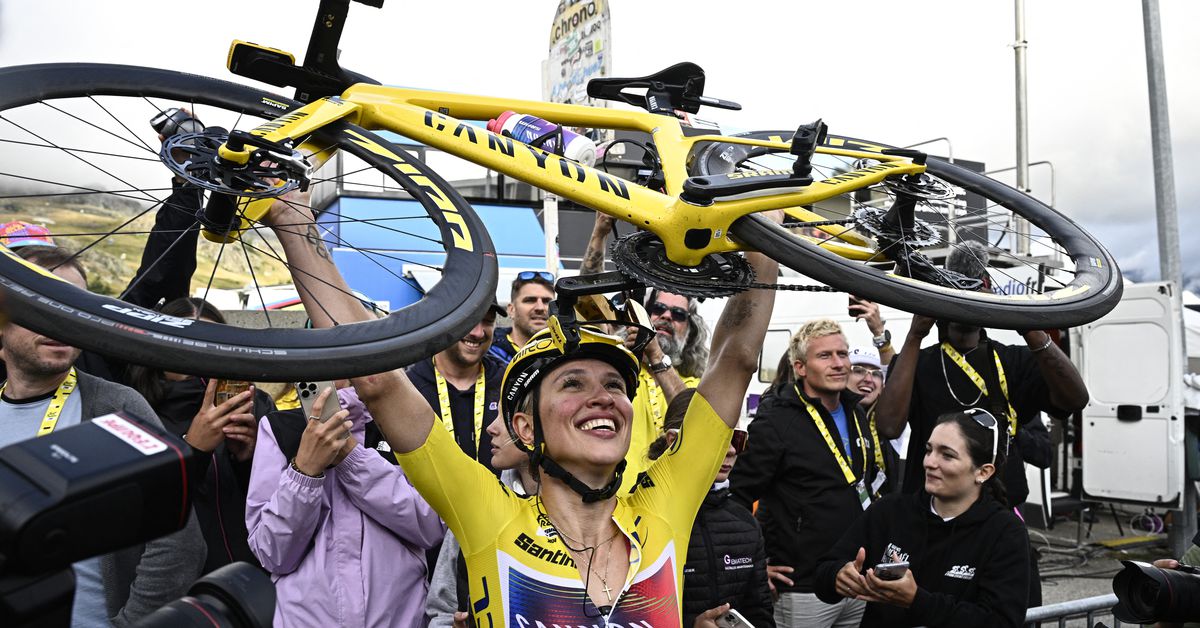Sprinting the final meters up the legendary Alpe d’Huez climb in the French Alps, Katarzyna Niewiadoma knew she had to put it all on the line. Having entered the final stage of the 2024 Tour de France Femmes with a 1:15 gap over reigning champion Demi Vollering, the Polish rider was as close to defeat as she was victory.
In the end, she secured the prestigious yellow jersey in nail-biting fashion. When Niewiadoma crossed the finish line after eight days and almost 25 hours of racing, only 4 seconds separated her and second-placed Vollering.
Vollering had initially taken the race lead by winning the individual time trial on Stage 3. Her advantage over the rest of the peloton wasn’t meant to last: following a crash two days later, she dropped down to eighth at 1:19 down to new leader Niewiadoma.
While Niewiadoma had to ship four seconds to her rival on Stage 7, the gap was still sizable between the two. This, in turn, set up a memorable final stage.
One of the most difficult stages in recent memory, the 150 kilometers from Le Grand-Bornand to Alpe d’Huez featured 3,748 meters of elevation gain and two climbs of the so-called “hors categorie” — the toughest used by the race. The final 13.8 kilometers to the finish went all uphill, inviting an exciting finish.
Vollering, however, did not intend to wait that long. The 27-year-old, who had already won the Vuelta España earlier this season, attacked on the second-to-last climb. Only one woman was able to follow, and it wasn’t Niewiadoma: Pauliena Rooijakkers, who had entered the day in seventh place in the general classification 1:13 on the race leader but 2 seconds ahead of Vollering, was able to keep the wheel of her Dutch compatriot.
With Vollering leading the way up and down the 1,923-meter Col du Glandon, the gap to Niewiadoma ballooned to almost 1:30. However, the cooperation between her and Rooijakkers on the subsequent flat segment was lacking, which allowed the group including the yellow jersey to make a frantic comeback.
Despite that, Vollering and Rooijakkers entered the initial slopes of the final climb up 40 seconds. That advantage again started to go up quickly, and eventually the lead started to slip from Niewiadoma’s grasp once more.
At one point, it looked like the three-woman battle between her, Vollering and Rooijakkers might come down to the 10, 6 and 4 bonus seconds to be distributed on the line.
Ultimately, however, Vollering and Rooijakkers had to pay the price for attacking more than 50 kilometers from the finish: Niewiadoma started to find her rhythm and kept the gap stable at around a minute — which would have been enough to hold onto the win even if she lost out on any bonus seconds.
At the end, she did just that. She still ended up victorious, though.
With Niewiadoma shipping 1:11 to Vollering, who had dropped Rooijakkers in the final meters to celebrate her second stage win, the race victory overall went to the 29-year-old over the defending champion. It is the biggest success of her career, and her first win in a stage race in five seasons.
“The whole stage was such a crazy rollercoaster,” Niewiadoma said. “On Alpe d’Huez I just knew that I had to pace myself smartly, and give my best in the last 5k to just minimalize the gap as much as possible. And to be honest, I lost faith I could still do it. And then, in the radio they were screaming so much in the last 2k.
“I went through such a horrible time on this climb. I hated everything. To then arrive at the finish line and learning that I won the Tour de France, it is insane. It’s so mind-blowing.”
Niewiadoma beat Vollering by 4 seconds, and Rooijakkers by 10. For comparison, the men’s version of the Tour de France in July was decided by over six minutes, with 9:18 separating the top three.

